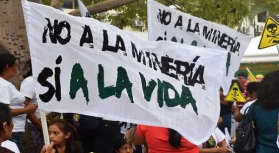Salvadorans Reinforce Commitment to Sustain Historic Mining Ban on its First Anniversary
A year since El Salvador's legislature unanimously approved a law prohibiting all metal mining activities in the country, Salvadoran organizations including the National Roundtable Against Metallic Mining are reaffirming their commitment to ensure the small Central American country continues to be an example to the world in the defense of precious water supplies. They are also warning of the risk that the law could be repealed.
The archbishop of El Salvador, Jose Luis Escobar Alas, a fierce proponent of the prohibition declared during his Sunday March 25th press conference that “to repeal the mining prohibition and to give multinational corporations control over natural resources would be considered an act of treason by the Salvadoran population.”
The ban’s approval was hailed around the world as an important victory of a broad movement of Salvadoran communities, social and non-governmental organizations, and faith groups in concert with international partners. They kept pressure on the government and multinational mining companies for more than 12 years before achieving the ban in a country where an estimated 79.5% are opposed to any gold mining.
“The mining prohibition is a testament to our people’s commitment to protect the environment for future generations. It is dedicated to those who continued the struggle despite a campaign of brutal repression, including four murders that have yet to be fully investigated. This effort is dedicated to these environmental defenders, the martyrs of Cabañas, who were murdered for their convictions,” stated Vidalina Morales, a member of the National Roundtable Against Metallic Mining.
El Salvador’s ban has also been inspiring organizations and commentators in Haiti and the Philippines, who believe that wisdom could be gained from El Salvador’s choice to protect its water rather than opt for the the short-term financial gains from metal mining.
The Salvadoran legislature passed the law just months after a World Bank investment tribunal rejected OceanaGold’s claim for US$250 Million against El Salvador for not having granted it a permit to mine. The International Centre for Settlement of Investment Disputes (ICSID) instead ordered the company to pay US$8 million in legal fees and costs to the government of El Salvador.
“After a long seven years of fighting this suit, during which there was a chill cast on policy making in the public interest, Salvadorans finally won the ban. However, ICSID rulings do not affect the ability of multinational corporations to hang onto their interests and OceanaGold has remained in the country showing disdain for the clear message that Salvadorans have sent about the mining-free future they want,” said Manuel Pérez-Rocha of the Institute for Policy Studies.
In Melbourne, where the Canadian-Australian firm OceanaGold has its headquarters, the Maritime Union of Australia has been holding monthly rallies outside its office ever since the company acquired the El Dorado mining project in 2013.
“We won’t give up as long as OceanaGold remains in El Salvador. They must be held to account here as well for showing disrespect for the people’s right to self determination,” remarked labor activist Kevin Bracken.
While the law was introduced with cross-party support a year ago, community organizations are concerned that the results of March 4th legislative elections could put the ban at risk. Power in the legislature has become concentrated in the hands of a single party, ARENA, whose aspiring presidential candidate is known to have ties with international mining interests.
“We have argued, with scientific support and based upon experiences from neighboring countries, that introducing industrial scale mining in the country would jeopardize vital water supplies with disastrous consequences for local populations. We want our incoming legislators to know that we will double and triple our efforts to make sure they do not capitulate to big mining interests,” commented Rodolfo Calles, National Coordinator of the Association for the Development of El Salvador (CRIPDES).
“The presence of minerals has frequently been called a ‘curse’ on peoples and governments; once gold or other minerals are found, there will be constant interests hovering over them. Nonetheless, the demonstrated tenacity and ability of Salvadorans to draw literally hundreds of organizations around the world to join them a they to defend their preference for water will persist,” remarked Jen Moore for MiningWatch Canada.
CONTACTS:
AUSTRALIA: Kevin Bracken, Maritime Union of Australia, [email protected]
EL SALVADOR: Pedro Cabezas, Association for the Development of El Salvador (CRIPDES), [email protected], +503-7498-4423
CANADA: Jen Moore, MiningWatch Canada, [email protected], +1 613 569 3439
UNITED STATES: Manuel Pérez-Rocha, Institute for Policy Studies (IPS), [email protected], + 1 240 838 6623
###

 "I am a CISPES supporter because continuing to fight for social justice and a more people-centered country means continuing the dream and sacrifice of thousands of my fellow Salvadorans who died for that vision.” - Padre Carlos, New York City
"I am a CISPES supporter because continuing to fight for social justice and a more people-centered country means continuing the dream and sacrifice of thousands of my fellow Salvadorans who died for that vision.” - Padre Carlos, New York City

